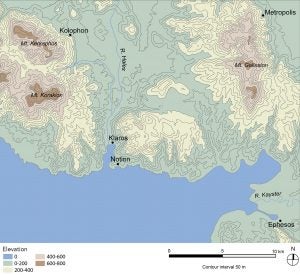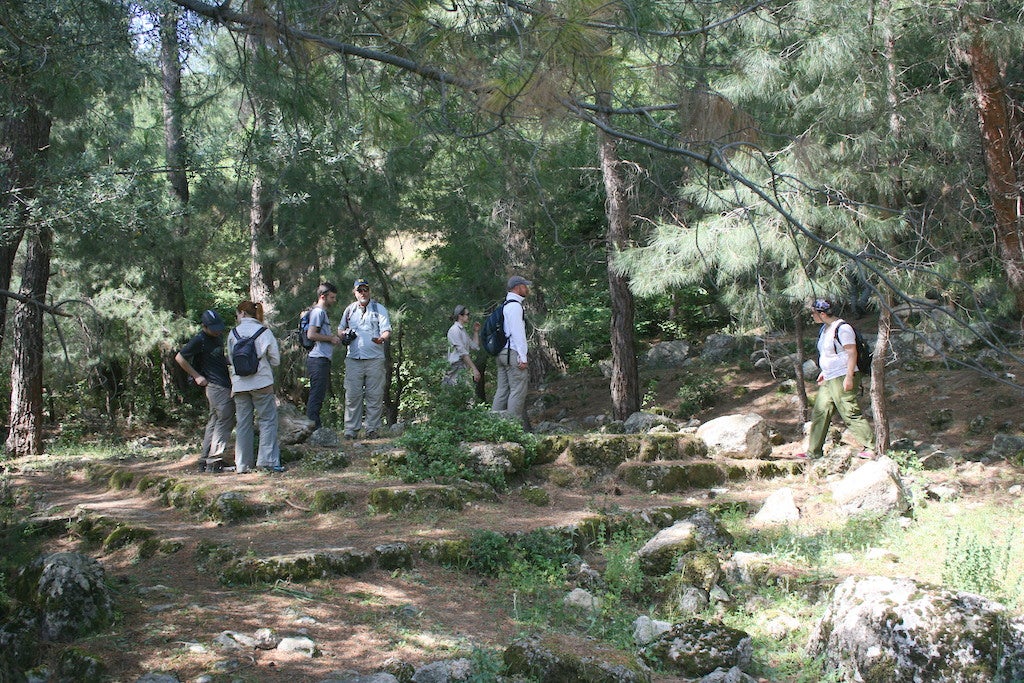Early History
The name Notion (τό Νότιον, Thuc. 3.34.1) means “the southern place,” probably in reference to Notion’s location with respect to Kolophon. The first attestation of the name occurs in the late 6th or early 5th century BCE: Hekataios of Miletos (fr. 233) says that Notion is a city of Ionia, while his near contemporary Herodotos (1.149) counts it among the cities of Aeolis. Bronze Age remains around Kolophon suggest that Notion was also occupied in the prehistoric era. By the Classical period at the latest, Notion was recognized as the harbor town of Kolophon, and this relationship remained crucial to both cities throughout antiquity. The harbor must have been located at the mouth of the Hales, but the precise situation of the original town of the Archaic and Classical period remains uncertain. Thucydides (3.34) describes Notion as “a city of the Kolophonians,” and Aristotle (Pol. 1303b) cites Kolophon-Notion as an example of a city that is separated geographically but united politically, and therefore susceptible to civil unrest.
7th – 4th Centuries BCE
Like other Ionian cities, Kolophon – and presumably also Notion in its original location – was conquered by the neighboring kingdom of Lydia in the 7th century BCE, and by Persia in the 6th century. The cities were “freed” by the Greeks in 479 BCE, but Kolophon was reconquered by Persia in 430 BCE. At that time, according to Thucydides (3.34), some of the Kolophonians fled to Notion, and Notion was divided between those who supported the Persians, and those who sided with the Athenians. This political division was reflected in the urban fabric of Notion, where a physical wall (διατείχισμα) allegedly separated the two factions. With Athenian help, the pro-Persian faction was expelled from the city in 427 BCE, and Notion later served as an Athenian military port. Throughout the mid-5th century, Notion was a member of the Athenian confederacy known as the Delian league. An important sea battle was fought off the coast of Notion in 406 BCE.
Hellenistic Period
The end of the Persian period came with the conquest of Alexander the Great in 334 BCE. Epigraphic evidence shows that in the late 4th century BCE, Notion and Kolophon formed a sympoliteia (a Greek term for an urban union), after which the twin cities shared laws and a calendar, and jointly collected taxes. When Lysimachus, one of the successor-generals of Alexander the Great, captured Kolophon in 294 BCE, part of the city’s population was resettled in nearby Ephesos, and part of the population, apparently, in Notion. At this time the port city was renamed New Kolophon or Kolophon-by- the-sea, and the inland city, now known as Old Kolophon, lost its importance and prestige.
Whatever the precise circumstances of the “re-founding” of the city, many other communities of western Asia Minor shared similar experiences in this period, as local populations and foreign warlords engaged in complicated and shifting maneuvers in pursuit of their sometimes conflicting, sometimes mutual interests. New towns were established in many places – on some occasions at the behest of royal administrations (eager, for example, to pension off military veterans, who would also serve as reserve soldiers in occupied territories), on others at the prompting of local communities (desirous, in their turn, of reaping the benefits of recognition as formally constituted cities). For similar reasons, preexisting towns were sometimes moved to new locations, and scattered smaller communities were consolidated into new urban centers. The project is interested in determining how archaeology can help us understand the circumstances of this particular example: to distinguish, for example, between top-down and bottom-up initiatives, and to determine whether or not the development of the promontory site was ultimately successful.
Roman and Byzantine Periods
The historical sources for these periods are meager, but Notion regained its free status after the Peace of Apamea (188 BCE), which marks the beginning of major Roman involvement in Asia Minor, and epigraphic evidence shows that it continued to exist through the Roman period, in part because it served as the port of the famous oracle of Apollo at Klaros. The connection between Notion and Klaros must have been crucial to the identity of the city at least until the advent of Christianity. In the later Roman period, inscriptions attest the existence of a Christian community at Notion, which was an episcopal see by at least the early 5th century CE.
Post-Byzantine Period
There are few conspicuous material remains of the Medieval and Ottoman periods in the Hales River valley. A significant portion of the local population of the region remained Greek-speaking until the establishment of the Republic of Turkey in 1923. In the late 19th and early 20th century, local Greek-speaking authorities, including religious officials, occasionally collected antiquities (especially inscriptions) from Notion. Among the local Muslim community, the ruins of Notion were known Gâvurköy or “Village of the Infidel.”




